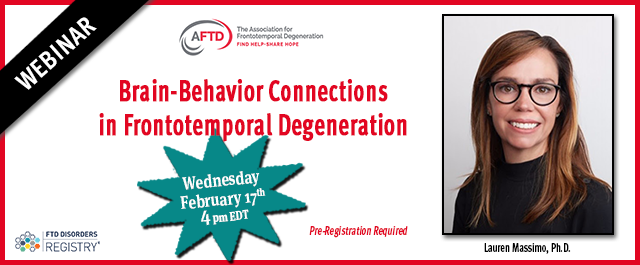PRESS & NEWS
AFTD Webinar: Brain-Behavior Connections in FTD – February 17, 2021

Learn about the connection between changes in the structure of the brain and behavioral symptoms during a webinar on Wednesday, February 17, 2021.
Learn about the connection between changes in the structure of the brain and behavioral symptoms during a webinar on Wednesday, February 17, 2021. Hosted by The Association for Frontotemporal Degeneration, the 90-minute presentation begins at 4:00 p.m. Eastern Standard Time (1:00 p.m. Pacific).
The featured presenter will be Lauren Massimo, Ph.D., an Assistant Professor at the University of Pennsylvania in the School of Nursing and the School of Medicine, Frontotemporal Degeneration Center. She will:
The cognitive and behavioral changes experienced in FTD are closely related to the loss of neurons in the frontal and temporal lobes of the brain. Understanding the connection between changes in the structure of the brain and behavioral symptoms is important for understanding the disease.
Knowledge of the neuroanatomical basis of FTD can help family caregivers, persons diagnosed, and healthcare providers better understand behaviors and develop care strategies to maximize quality of life.
Watch the recorded webinar below.
Together we can find a cure for ftd
The FTD Disorders Registry is a powerful tool in the movement to create therapies and find a cure. Together we can help change the course of the disease and put an end to FTD.
Your privacy is important! We promise to protect it. We will not share your contact information.



